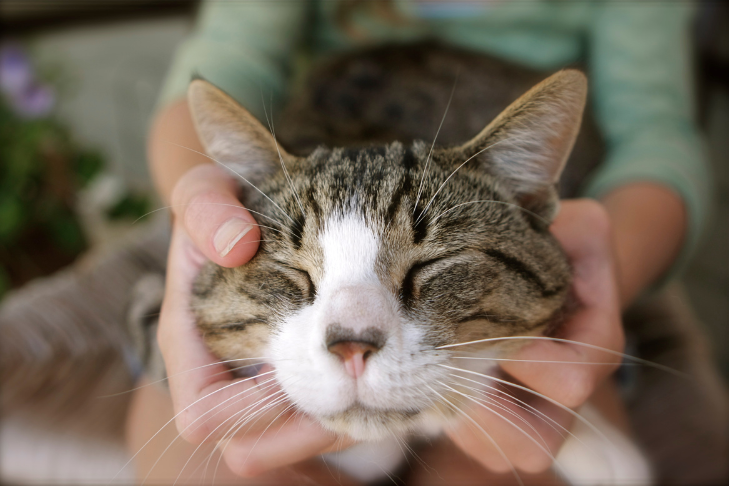Cat Heart Health: How to Support Your Cat’s Heart for Long-Term Wellness

You love your cat like family—and that means wanting the very best for their health. While heart conditions in cats can be difficult to detect, there’s plenty you can do to support your cat’s heart health proactively. From balanced nutrition and exercise to regular vet visits and high-quality supplements, maintaining a healthy heart is an important part of your cat’s overall wellness routine.
In this guide, we’ll cover how your cat’s heart functions, tips for proactive care, and how to build daily habits that support your feline friend for the long haul.
How Your Cat’s Heart Works
Your cat’s heart functions much like your own. It has four chambers—two atria and two ventricles—and pumps blood throughout the body to deliver oxygen and nutrients while removing waste like carbon dioxide. Oxygen-poor blood enters the right side of the heart, travels to the lungs for oxygenation, then returns to the left side of the heart to be pumped through the body. This constant circulation powers everything from playtime zoomies to relaxed afternoon naps.
Keeping this vital organ healthy means supporting the systems that affect it—especially the circulatory system, metabolism, and overall weight.
Nutrition and a Heart-Healthy Diet
A high-quality, protein-rich diet is essential for your cat’s overall health—including the heart. As obligate carnivores, cats typically require meat-based protein to thrive. When selecting a commercial food, look for real, named protein sources (like chicken or salmon) in the first few ingredients. A small amount of animal byproduct is acceptable, but the bulk of your cat’s food should come from whole, recognizable meat ingredients.
Carbohydrates and grains can be included in moderation. Look for whole-food sources such as:
- Brown rice
- Oats
- Barley
- Quinoa
- Sweet potatoes
Avoid foods that rely on ingredient splitting (e.g., “cornmeal,” “yellow cornmeal,” and “corn gluten”), which can disguise lower-quality fillers as minor ingredients.
Heart-Healthy Treat Alternatives
Supporting heart health also means keeping your cat at a healthy weight. Swapping traditional treats for nutrient-rich whole foods is one simple way to cut empty calories while adding beneficial vitamins and minerals.
Here are a few heart-conscious treat options for cats (in moderation):
- Fish (fully cooked salmon or canned sardines/mackerel) – rich in protein and essential fatty acids
- Spinach – offers vitamins A, C, and K, plus iron and calcium
- Cooked eggs – high in protein and B vitamins
- Cantaloupe – hydrating and antioxidant-rich
- Cooked poultry – great as a topper or treat
- Banana slices – provide potassium and fiber
- Oatmeal – packed with B vitamins and slow-release energy
- Apple slices – a source of fiber and vitamin C
- Blueberries – high in antioxidants
- Peas – contain plant protein, fiber, and vitamins A & C
Be sure to introduce new foods gradually and consult your veterinarian before changing your cat’s diet significantly.
Daily Supplements to Support Long-Term Heart Health
While a balanced diet provides a strong foundation, some cats may benefit from additional support—especially when it comes to maintaining healthy skin, joints, and cardiovascular function.
Pet Releaf Rituals Fish-Free Omega 3 is a clean, allergy-friendly supplement made from algae oil that provides the same EPA and DHA benefits as traditional fish oil—without the fishy smell, added calories, or risk of contaminants. These essential fatty acids are widely recognized for supporting overall wellness, including heart health, healthy circulation, and a normal inflammatory response. It’s an easy, daily addition to any cat’s routine—especially for those with fish sensitivities, picky appetites, or weight management needs.

Keep Your Cat Active
Just like in humans, physical activity is essential for maintaining cardiovascular health. Even a few short play sessions each day can help your cat stay fit and mentally stimulated.
Tips for encouraging movement:
- Use feather wands or laser pointers to mimic prey
- Rotate toys to keep things interesting
- Introduce food puzzle toys to combine mental and physical engagement
- Create vertical climbing spaces to encourage movement throughout the day
Aim for at least 15–20 minutes of active play daily. Keeping your cat at a healthy weight can reduce strain on their heart and improve overall energy and mood.
Don’t Skip Vet Visits or Dental Care
Routine veterinary checkups are one of the best ways to stay on top of your cat’s health, including heart health. Your vet can listen to your cat’s heartbeat, monitor changes in weight or behavior, and recommend early interventions if needed.
Dental care is another often-overlooked piece of the puzzle. Poor oral hygiene can lead to gum disease, which may contribute to inflammation and impact other organs—including the heart. Regular dental cleanings and at-home care like brushing, water additives, or dental treats can go a long way in supporting your cat’s overall health.
If you ever notice changes in your cat’s appetite, energy, or breathing, don’t hesitate to contact your veterinarian. Some issues can be subtle, so regular checkups and open communication with your vet are key to catching potential concerns early.
Supporting Lifelong Heart Health
While some factors like genetics are out of our control, there’s still plenty you can do to help your cat stay healthy as they age. Building consistent habits around nutrition, supplementation, physical activity, dental care, and regular vet visits can make a meaningful difference in supporting your cat’s heart and overall well-being. Proactive care isn’t just about preventing problems—it helps set them up for a healthy, happy life!


